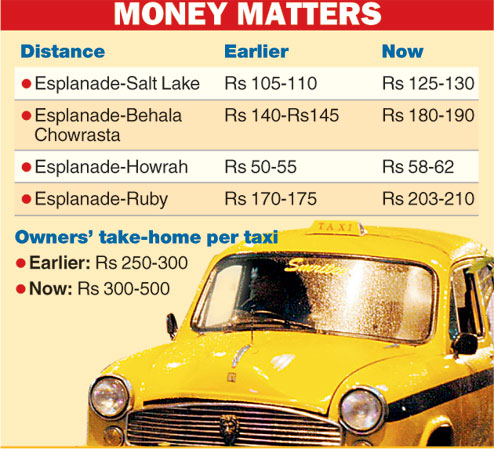 |
A taxi fare hike by as much as 20 per cent has failed to achieve what most Calcuttans had hoped for — minimise taxi refusal.
The state government had announced the fare hike on October 31 following persistent demands from the operators triggered by the spiralling diesel price. While pressing for the hike, the leaders of the operators unions had claimed that lower returns compared with rising operational cost was the key reason for taxi refusal.
“Post-hike, I have to pay around Rs 190 for a ride from Esplanade to Behala Chowrasta, around Rs 35 more than what I paid earlier. But even then I have to plead with cabbies to go,” said Tirtha Roy, a private bank employee. “Taxi refusal has remained much the same. And it’s almost impossible to get a cabbie to travel to Behala from the heart of the city after 9pm.”
Tirtha’s plight is not an exception.
Taxi refusal continues unabated even two months after the revised fares came into effect, transport minister Madan Mitra’s promise to crack down on errant drivers notwithstanding.
The rising number of complaints of taxi refusal had prompted Mitra to call a meeting of the owners on December 19. A section of the owners asked the minister to fine errant drivers, instead of the owners, for refusal — a move a prominent taxi association feels is the only way to stop the menace.
The government, on its part, decided to “step up” the crackdown and threatened to cancel permits of owners whose vehicles will be booked for refusal. “The government has done enough for the operators and will not play to their tune anymore,” Mitra told Metro. “The police have been asked to ensure that complaints of taxi refusal are handled more sternly.”
Out on the road, however, such claims ring hollow.
Ask Shibaji Chaudhury of Jodhpur Gardens. “I was accompanying my eldest daughter who was trying to hail a taxi on December 13 at Jodhpur Gardens to reach Ballygunge Circular Road. It was around 10.15am. We stopped a taxi but the driver said he would only go to the airport. When I asked why, the driver tried to hit me,” Chaudhury wrote in his complaint to the police. “I am a senior citizen. Do I deserve such behaviour,” Chaudhury later said.
He has also sent his complaint to the public vehicles department and a clutch of taxi associations.
Calcuttans know that refusals multiply many times at night when public transport options are few and far between.
But this was not to be.
Back in April, the state government had declared a night tax of 15 per cent of the fare to reduce instances of refusal. The taxi operators had then said this was the government’s way of giving its stamp of approval on the practice of charging more for travelling in taxis at night.
However, almost seven months later the situation remains the same.
“Taxi refusals continue despite our appeals. The fares have gone up substantially but that has not stopped drivers from refusing to ferry passengers. It’s sad that no one is ready to listen to us,” said Sudha Saha, the secretary of the Progressive Taximen’s Union.
Nearly all taxi operators in the city are now loyal to the Trinamul-led union, whose president is transport minister Mitra. An insider said the organisation commands a membership of over 15,000 in the city and adjoining areas.
The other main taxi union in the city, Bengal Taxi Association, feels that unless taxi drivers are made to pay the fine, instead of the owners, things wouldn’t change.
“It’s true many taxis don’t want to travel short distances at night. Most prefer either heading towards their garages while others look for an opportunity when they can demand more from a passenger for travelling a longer distance,” said Bimal Guha, the secretary of the Bengal Taxi Association. “It beats us why taxis refuse passengers at night despite the night rate being in place.”
The public vehicles department seems too “overworked” to take up the issue.
“We do receive complaints and hearings are conducted on a regular basis but a fine is slapped depending on the gravity of a complaint. However, there is an acute staff shortage and other things take priority,” said an official in the department.
That leaves passengers with only the police to deal with complaints of refusal.
“The deputy commissioner (traffic) usually holds a hearing following a complaint. Depending on the case, the driver’s licence is punched. At times, the driver is also slapped with a fine of Rs 100 under Section 177 of the Motor Vehicles Act,” said an officer. “Special teams have been set up to crack down on errant drivers. The traffic guards, too, have been asked to step up vigil.”









